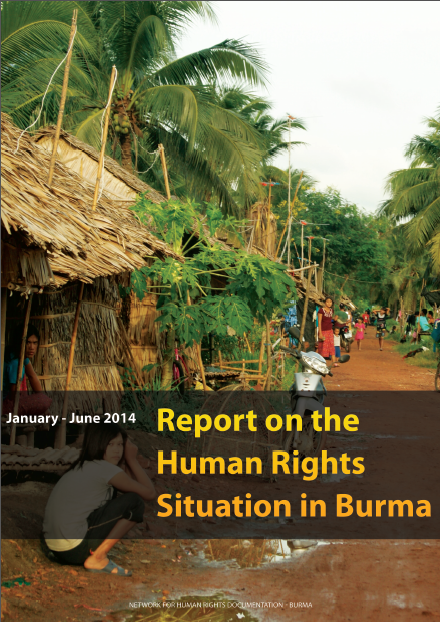January – June 2014: Report on the Human Rights Situation on Burma
By Network for Human Rights Documentation – Burma • August 14, 2014The Network for Human Right Documentation-Burma (ND-Burma) is an organization that documents and reports human rights violations taking place throughout Burma. We are a watch-dog for human rights violations and are continually monitoring the human rights situation in Burma.
This report covers the first period of 2014 and focuses on 103 documented cases of human rights violations in Burma from January-June 2014. There are many serious human rights violations addressed and highlighted in this report, including: torture, extra-judicial killing, illegal arrests and detention, arbitrary taxation, property crimes, forced labor, human trafficking, forced displacement and rape.
Even though President U Thein Sein promised to release all political prisoners by the end of 2013, there are still many political prisoners in Burma, including new detainees in 2014. Many human right defenders and activists have been arrested under the Unlawful Association Act of 1908, Section 5 (e) and 5 (j) of the Emergency Provisions Act, and Section (18) of the Right to Peaceful Assembly and Peaceful Procession Act. For example, U Win Cho and U Nay Myo Zin were arrested under Section (18) for protesting the confiscation of land in Kyauk Ta Dar Township, Yangon. Moreover, innocent Kachin IDPs were arrested under Section (17) of the Unlawful Association Act for suspected contact with ethnic armed groups. These actions reinforce the fact that the government in Burma is still willing to use oppressive and unjust laws against the Burmese people.
With regards to media freedom, developments in this period warn of tightening regulations and a narrowing of the operating field of the Burmese media. The government has attempted to apply a new law regarding media, the Printers and Publishers Registration law, against the wishes of the people. This law allows the Ministry of Information to issue and withhold publication licenses, and is viewed as a bulwark against the development of ethnic media groups; “It is unacceptable to prescribe specific media registration in a transition of democratic change. This law can especially hurt the ethnic media development which is just on its fledgling stage. It will give the Local governments the power to restrict the ethnic media by using various pretexts such as security reasons” stated Khine Myrat Kyaw, editor for BNI and defender of ethnic rights. In addition, the four journalists and CEO of Unity Journal were handed heavy sentences under the Official Secrets Act after Unity Weekly published a report in January which accused the Burmese government of secretly using a facility in Magwe’s Pauk Township as a chemical weapons factory. Freedom of Expression and a strong, independent media are vital to a healthy democracy; these recent attempts to silence the media within Burma are therefore unsettling, and should be monitored closely.
During president Thein Sein’s regime, there have been massive land confiscations in Burma in relation to development projects of foreign corporations and the military. The State Agriculture Department in Burma records show that in January 2010, 216 companies received a total of 1.75 million acres (708,200 hectares) of farmland in the form of state concessions. Although people have lodged complaints with the government for the return of their lands, the government has not taken definitive steps to redress these issues. This is in contradiction to the rhetoric of the current government, which announced that land that had been unjustly seized would be returned. Moreover, President Thein Sein has now admitted that the government can’t return over 30,000 acres of the paddy lands confiscated by the state two decades ago. Land confiscation has created large numbers of internally displaced people within Burma, and has contributed to cases of poverty, unjust arrest and detentions, and the proliferation of drug abuse in some communities. The return of land seized during the military junta, as well as the immediate cessation of new land seizures by foreign corporations, are therefore prerequisites to working towards a Burma that is free of human rights abuses.
People continued to demand amendments to Section 436 of 2008 Constitution, which prevents Aung San Suu Kyi from becoming the president. Groups have also protested against the amnesty which the constitution grants to public servants who have committed crimes, and the over representation of the military that it guarantees. Rather than addressing these problems, the government has repeatedly arrested protesters. Without amendments to the constitution, the growth of democracy in Burma will be jeopardized and the possibility for future human rights abuses remains.
In relation to these developments, the government has also been arguing for the adoption of Proportional Representation (PR) for the upcoming 2015 elections. Most groups, including the NLD, and the ethnic political parties, are against the change, citing that the countries democracy is too young and too divisive at this point. Ethnic groups are especially concerned, due to the fact that their long term survival and interests would be put into question if the switch was made. The USDP has disregarded the opinion of the official opposition NLD, as well as the minority groups, in another demonstration of its lack of commitment to democratic ideals. It remains committed to the change, and talks are ongoing. […]
Tags: Buddhism, Burma Army, Ceasefire Agreement, Daw Aung San Suu Kyi, Freedom of Expression, Government of Myanmar, Human Rights Violations, IDPs, Journalists, Kachin, Land Confiscation, Media, National League for Democracy, Network for Human Rights Documentation – Burma, Political Prisoners, President Thein Sein, Proportional representatives, Union Solidarity and Development PartyThis post is in: Human Rights, Spotlight
Related PostsBurma’s Religious Conversion Bill is “Major Setback for Religious Freedom and Human Rights”
UN Myanmar Rights Expert: Backtracking on Democratic Space Gains Momentum in Election Year
Myanmar’s Proposed Race and Religion Laws are Discriminatory and should be Scrapped
Burma: Religious Freedom and Related Human Rights Violations are Hindering Broader Reforms
Burma: USCIRF Issues Report on Religious Freedom and Related Human Rights Violations










 All posts
All posts